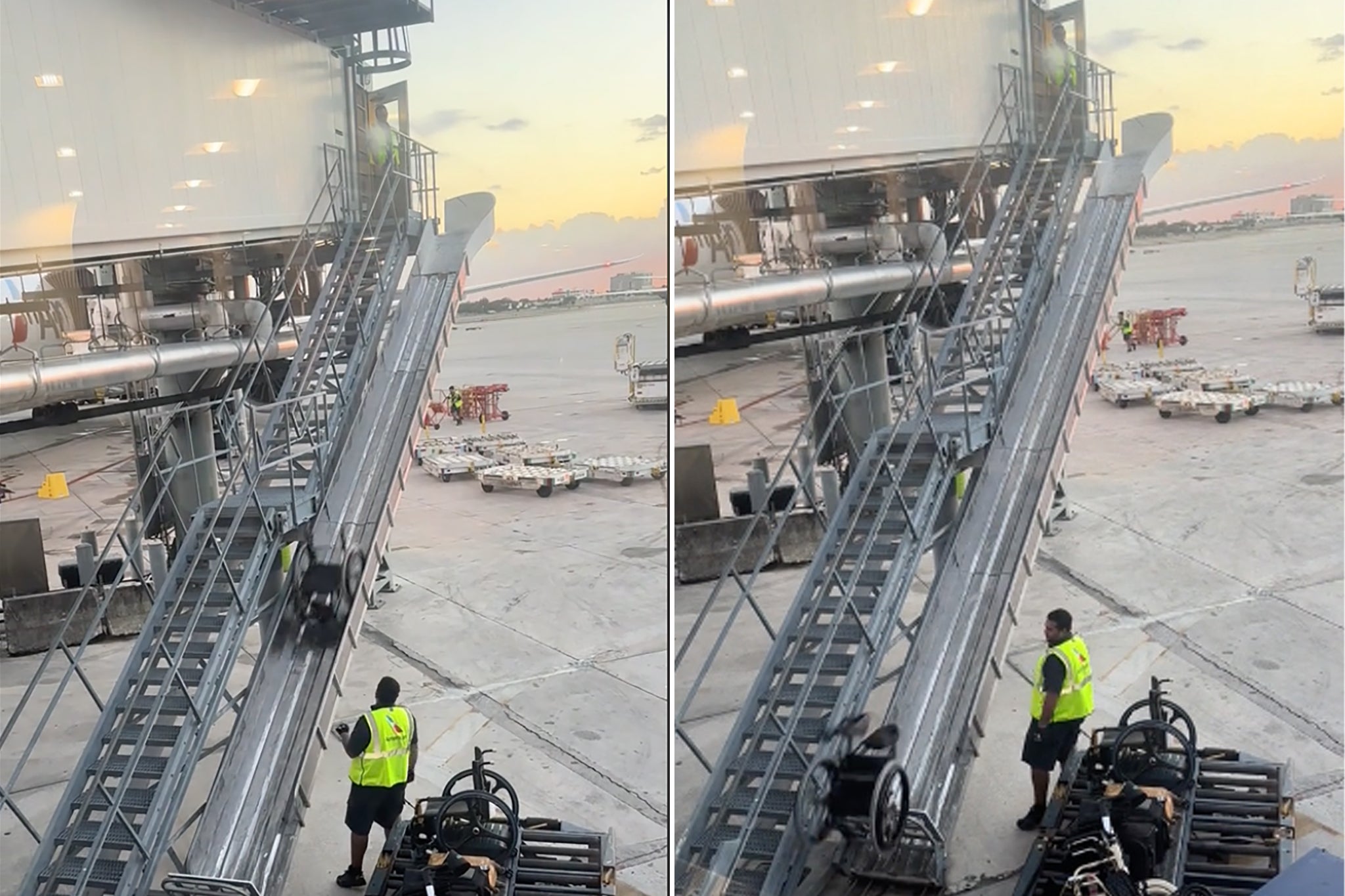A viral TikTok video exposed how airports humiliate disabled passengers – here’s how to fix it
In the clip, some poor traveller’s wheelchair is thrown down a chute at a US airport, writes James Moore. But now Rights on Flights is proposing a bill to stop this kind of shocking incident from ever happening again


A viral Tiktok has exposed yet another way in which disabled passengers are mistreated at airports – and this time it’s a scandal that’s usually hidden, even to victims.
In the clip, some poor traveller’s wheelchair is thrown down a chute at a US airport. It careens its way down towards the tarmac, picking up speed until it crashes into a barrier at the bottom before launching into a brief end-over-end flight before coming to a halt.
A baggage handler, unaware he is being filmed, simply dumps the battered equipment – which, let us remember, serves as someone’s legs – onto a cart.
If you ever wondered how wheelchairs could get smashed to pieces on a simple journey from A to B, now you know.
“Shocking, isn’t it?” I ask television presenter and campaigner, Sophie Morgan.
“Not really. I’m not surprised at all,” she replies. After all, she has already had to deal with having her kit getting bust-up this year. “This has been going on for decades. Disabled people have basically been designed out of aircraft.
“The problem is that there are just so many people involved; there are aircraft manufactures, airlines, airports, support service providers, and they’re all competing for contracts and the service is completely disjointed so disabled people get lost.
“Training simply isn’t good enough but the real issue, as in every other case involving us, is that it’s all run by non-disabled people and they’re not addressing it because they just don’t understand.”
Morgan’s work means she must regularly enter the disabled air traveller’s bad luck lottery, where prizes including damaged kit and being stranded without assistance.
But she refuses to take this lying down, and has now formed a “Rights on Flights” campaign to address what ought to be viewed as a scandal by all passengers, not just the disabled.
Morgan spoke to me ahead of a trip to Los Angeles; she will not eat or drink for hours before her flight, to save herself the hassle of having to deal with airlines’ provisions for helping disabled people use the bathroom facilities.
She says she understands why many disabled people simply give up rather than put themselves through such humiliation. She doesn’t blame those of us that do, but it frustrates her that it should be this way.
With the exception of a short hop to the Isle of Man for a funeral, I have remained on the ground since my body was wrecked by a cement truck. The risk of having my kit damaged, of being treated badly, of stress? More than my frazzled mind can deal with.
But I also know my decision lets the travel industry off the hook; when people like me opt out of flying, we let a complacent and discriminatory industry get away with it.
Morgan’s bill proposes an Assisted Air Travel Act, which she says would ensure that every passenger receives safe and dignified air travel (technically it is a bill; it would need to become law to become an act.) It would ensure better standards of service for all disabled passengers, and better compensation where that fails. Drafted with the help of accessibility experts and lawyers, the right law could persuade more of us to take to the skies.
The campaign hopes an MP can use the private members’ ballot to try and push the plan through parliament. Perhaps the government could allocate parliamentary time to it? Heaven knows, Rishi Sunak and co could use some good PR on the disability front. Labour, which itself doesn’t itself have a spotless record on disability, might care to include it in the forthcoming manifesto. A note to politicians: we might not be able to fly with dignity, but we can still vote.
Disabled traveller Ben Furner, who was once left stranded on a plane when his mobility scooter failed to start up after arrival, sums the problem up: “You’re just constantly anxious when you travel because you never know when something might go wrong and you don’t feel confident that people who are responsible for assisting disabled people will deliver.”
Transport for the disabled is something we all need to talk about – not just when it captures our attention on TikTok.
Join our commenting forum
Join thought-provoking conversations, follow other Independent readers and see their replies
Comments
Bookmark popover
Removed from bookmarks